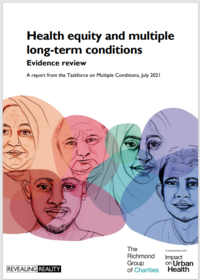 by Bola Owolabi, Director, National Healthcare Inequalities Improvement Programme
by Bola Owolabi, Director, National Healthcare Inequalities Improvement Programme
Health inequalities are unfair and avoidable differences in health across the population, and between different groups within society. They arise because of the conditions in which we are born, grow, live, work and age. These conditions influence how we think, feel and act and can impact both our physical and mental health and wellbeing.
This #BoneJointWeek I am delighted to see the Arthritis and Musculoskeletal Alliance’s commitment to taking action to narrow musculoskeletal health inequalities, particularly with regards to listening to the experiences of underserved communities and working in partnership to improve care.
In England around 10 million adults, and 12,000 children, have a musculoskeletal condition. Ethnic minority groups, people from lower income households and those living in areas of high deprivation are most affected. People living in the most deprived areas are also more likely to report back pain, at younger ages. The effect this can have on people’s everyday lives should not be underestimated.
Musculoskeletal conditions can impact people’s activities of daily living (ADLs) and are a leading cause of disability for millions of people in the UK. Back pain is also known to be a leading cause of sickness absence amongst employees which can adversely impact upon people’s livelihood with implications for their health.
 An evidence review by the Richmond Group of Charities into Health Equity and Multiple Long Term Conditions highlighted that disability is a key characteristic that accounts for health inequalities, and people with severe disabilities face higher odds of having unmet needs. Furthermore, families with a disabled person in the home are significantly more likely to be materially deprived and be in food poverty.
An evidence review by the Richmond Group of Charities into Health Equity and Multiple Long Term Conditions highlighted that disability is a key characteristic that accounts for health inequalities, and people with severe disabilities face higher odds of having unmet needs. Furthermore, families with a disabled person in the home are significantly more likely to be materially deprived and be in food poverty.
The strong correlation between socio-economic disadvantage and negative health outcomes has been highly considered in research to date, which is why the National Core20PLUS5 approach to reducing healthcare inequalities identified the most deprived 20% of the national population as a key cohort requiring targeted intervention. The approach also identifies ethnic minority communities and inclusion health groups as those at greatest risk of experiencing inequalities.
During the COVID-19 pandemic, a harsh light was shone on the unfair and avoidable differences in health across populations and which disproportionately impact those who already face disadvantage.
As we restore NHS services there is a renewed focus on increasing the scale and pace of NHS action to narrow the gap, and in January 2021 the National Healthcare Inequalities Improvement Programme, was established. Working across all NHS England programmes and policy areas, the programme seeks to hardwire healthcare inequalities improvement into NHS strategies, policies, initiatives and programmes to ensure equitable access, excellent experience and optimal outcomes for all.
Leaders throughout the NHS and healthcare professionals are being asked to take a quality improvement approach to narrowing healthcare inequalities including in relation to musculoskeletal services. This approach is three-pronged:
- interrogating data to surface inequalities in access, experience and/or outcomes
- co-producing solutions for narrowing the gap with people and communities who are seldom heard
- taking a strengths-based approach that identifies and builds on the assets of individuals and communities to improve their own health.
A number of resources are available to support regions, systems and places in this important work including the Healthcare Inequalities Improvement Dashboard which brings key strategic indicators relating to healthcare inequalities together in one place; making it as easy as possible to identify priorities for targeted action.
Guidance on what works in narrowing healthcare inequalities, including information on co-designing solutions with people and communities, is also available.
Finally, the recent ARMA report MSK Health Equalities is a powerful contribution in our shared vision of exceptional quality healthcare for all: ensuring equitable access, excellent experience and optimal outcomes.
